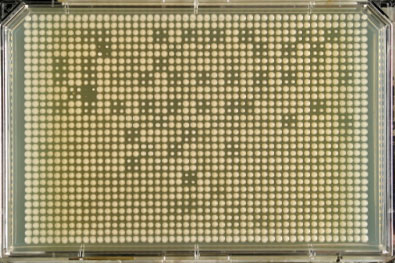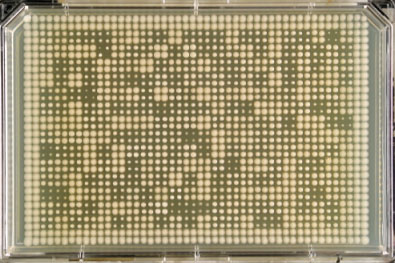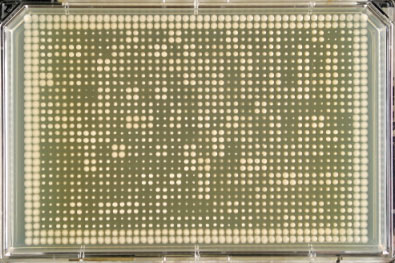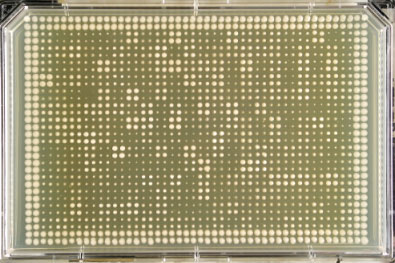| 1. | Genetic Networks: Large-Scale Mapping of Synthetic Lethal Interactions | |
| a. | Mapping Genetic Interaction Networks | |
| b. | Genetic Interaction Data - Imaging, Processing, and Analysis | |
| c. | Temperature Sensitive Conditional Mutant Collection | |
| d. | Modeling Genetic Networks | |
| 2. | Sigma Deletion Mutant Collection | |
| 3. | High-Content Cell Biology | |
| 4. | Chemical-Genetics | |
| a. | Comparing Chemical-Genetic & Genetic Interaction Networks | |
| b. | Barcoded Yeast Gene Library: Drug-Resistant Mutants and Dosage Suppression | |
| 5. | Mapping Protein-Protein Interaction Networks for Peptide Recognition Modules | |
Genetic Networks:
Temperature Sensitive Conditional Mutant Collection
Collaborative Project with Brenda Andrews' Lab
People
Zhijian Li, Sondra Bahr, Ermira Shuteriqi
Our initial efforts focused on the identification of genetic interactions between non-essential genes. Based on these studies, we estimated that the complete yeast synthetic genetic network will comprise ~100,000 interactions. However, our subsequent studies revealed the importance of essential gene interactions and suggested that systematic identification of these interactions will likely augment network density to ~200,000 interactions [Davierwala et al, 2005].
In order to map genetic interactions for essential genes efficiently and ultimately increase network resolution, we are creating a collection of conditional alleles of essential genes, specifically temperature sensitive (ts) alleles in the S288c deletion mutant genetic background. From ~280 laboratories, we collected ~1300 ts alleles covering ~650 essential yeast genes. Using a PCR-based homologous recombination strategy, we amplified each ts allele and integrated it into the genome of BY4741 (MATa, his3D1 leu2D ura3D0 met15D0 ) such that each allele is marked with a kanamycin resistance gene (kanR).
To date, we have constructed ~800 ts allele strains representing ~500 essential genes, accounting for ~45% of all essential genes in yeast. The array of ts yeast strains is healthy at the permissive temperature (22°C) but many colonies fail to grow at the restrictive temperature (35°C) (Fig 5). The ts array can be used for scoring genetic interactions as well as high copy suppression analysis.

22°C

33°C

35°C

38.5°C


